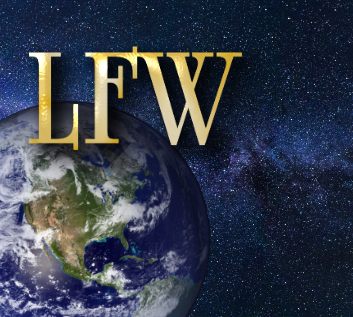The Fires of Hope, Love and Determination to Save the World~ advancing the daily campaign to multiply goodness ~ Mar 29, 2009 “Love feels no burden, thinks nothing of trouble, attempts what is above its strength, pleads no excuse of impossibility ... though weary, it is not tired ... though alarmed, it is not confounded ...” On a recent Saturday afternoon, I found myself sitting in our bedroom, staring through the window at the world outside, overcome with gloom. The threat of nuclear suitcase bombs and other terrors weighed heavily on my heart. I imagined the infrastructure of our cities laid waste, with cars abandoned for lack of fuel. As my mind trudged through what-if scenarios of the Communist Chinese invading America, and Islamic homicide-bombers killing millions, I wondered why I should continue to build a business and career if it was all going to end in destruction. “Why bother?” said the gloom. “Why not become a survivalist and escape to the mountains?” Then I got mad. Mad at despair and hopelessness. Mad at the lie contained in the spirit of defeat. Mad at the idea of lying down in the middle of the road of life and waiting for trucks of destruction to drive over my body; mad at the thought of disappearing into the gloom without a whimper or a bang. Mad at the idea of giving up on the world. I believe that there are many people today who are being sucked into the swamp of despair. When one examines all the variables, the what-ifs, the risk factors and the evil that lurks in the hearts of all the people who are leading active lives of hate, then it may seem that there is indeed little hope of victory. Yet, if we could ask all of the six billion people of the world if they wanted to live in peace, is it not true that a huge majority would raise their hands and say, “Yes!” If we asked them if they hoped for a world without hatred and fear, a world of freedom from tyranny and war, and a world of prosperity, I am convinced that almost all of the citizens of the world would confirm that this is indeed their dream. It is a tremendously hopeful fact that the standards of love and ethics around the world have made astounding advances in the last five thousand years. History was very dark for a very long time, and brutality was not only commonplace, it was hardly even questioned. Even though the twentieth century was a time of terrible upheaval and bloodshed, goodness and peace have prevailed to a significant degree. Hitler was defeated. Soviet communism was rejected by its own people. European colonies were freed. Racism is rapidly declining. Slavery (with the exception of criminal enterprises) has almost disappeared. Women’s rights have been established in the Western world, and are beginning to be examined in Muslim countries. A global consensus is sweeping the world that peace and decency is a Good Thing. If one accepts that God has been the driving force of history, slowly and patiently lifting humankind out of the mud and bloodshed of the past, and helping us advance to where we are today, wouldn’t it make sense that God wants humankind to succeed? If He was planning a huge Armageddon, why would He waste His time trying to transform the world? I can’t help but believe that He would very much prefer it if we all managed to love each other, rather than blow ourselves to bits. This is not to say that the world is not at risk. The weapons of war available to those who hate have become more terrible and fear-inducing. Thomas Merton wrote of “the three poisons: craving, hatred, ignorance.” Too many people are still living under the dominion of poisoned lives, raised in radical environments where they are taught to fear and hate. Yet, “hate is just a failure of imagination”, as Graham Green wrote. Those who hate have not been able to imagine a world of goodness and beauty. They may think that they are ardent followers of religion, yet as fearful and unloving people who spread violence and terror, they should not ignore the words of Mahatma Gandhi, when he said, “Where there is fear, there is no religion.” I am convinced that radical Islamic “homicide-bombers” (for let us not dignify their suicides) are individuals whose souls are dwelling in very small boxes; small worlds created by their own ignorance and hatred and fear. They fear others, and as the poet William Butler Yeats said, “If one is afraid of looking into a face, one hits the face.” They hit and murder, and forget Gandhi’s words that “An eye for an eye only makes the whole world blind.” We, the rest of the world, the majority who do not believe in hate as a way of life, must actively prevent this small minority of haters and murderers from destroying our world. The irony of homicide-bombers is that they use the technology of the West to destroy the West and all of its technology, all the while enjoying that very same technology in their personal lives. Their hearts are still living in the Dark Ages. We cannot let them push the world back to a world of hell and slavery and death. They may think that we are heretics, and they will be right, for the word heretic comes from the Greek word “hairetikos”, which means “able to choose”. We choose the way of peace and the way of love and the way of beauty. Most of all, we choose the way of freedom to create and build a world based on those virtues. The tyrants and the wannabe tyrants who roam the world, frothing at the mouth because they hate love and beauty, should remember that one should be careful of what one wishes for. As Calvin Miller wrote in his allegorical book, The Singer, “In hell there is no music – an agonizing night that never ends as songless as a shattered violin.” I don’t believe that radical Islamic terrorists have thought very deeply about the end result of their plans to destroy the world. Do they truly want to live in an agonizing night? What then, can we, as the majority, do to save the world? It is important to feel, to the bottom of our souls, that we are not alone in our desire to bring peace to the world. Over one hundred and fifty years after the birth of Christ, the Roman Emperor Marcus Aurelius wrote that we should “Constantly regard the universe as one living being, having one substance and one soul...”. Now, with studies being done in quantum physics, there is strong evidence that we really are all connected. Yoga International Magazine published an interview in 2005 with Dr. John Davies, of the University of Maryland. In the interview, titled “One Percent for Peace, The Real War on Terror”, he described experiments in Lebanon where as few as one percent of the population of certain towns participated in meditations and prayers for peace over a period of time. The study was replicated seven times, and during those times of meditation, violence in those locales dropped over 70%. The interview is on the web at HimalayanInstitute.org. This is a powerful example of not only how the human race is all connected spiritually, but an exciting demonstration of what we can do as individuals. It demonstrates that anyone can pray, and anyone can influence the creation of a world of peace. The truth found in quantum physics goes far beyond the doctrinal divisiveness of religion. The world of thought and mind and spirit is now being explored with such intense interest that I believe a commonsense world view based on God’s parental love will very soon be agreed upon by the majority of the world’s citizens. Whatever our religious beliefs, or even if we have none at all, it is reasonable to believe that we can all agree about the common virtues of unselfish love, kindness and mutual respect for all individuals. H. R. White, in a speech called This Momentous Day, quoted in the Dean Koontz novel, From the Corner of His Eye, stated, “Each smallest act of kindness – even just words of hope when they are needed, the remembrance of a birthday, a compliment that engenders a smile – reverberates across great distances and spans of time, affecting lives unknown to the one whose generous spirit was the source of this good echo, because kindness is passed on and grows each time it’s passed, until a simple courtesy becomes an act of selfless courage years later and far away.” Peter Drucker said that “the best way to predict the future is to create it.” With all of the strength of our being we need to fight against the spirit of gloom and hopelessness, and bring into a white hot focus our own fires of hope, love and determination to save the world. We may not feel special, or powerful, or terribly useful. But deep down in our hearts, we have the incredible power and freedom to give love to others, and to be unselfish and kind to all. It is that power that allows all of us to participate in advancing the daily campaign to multiply goodness, a campaign of true love that must and will transform the world. (Comments are moderated and must be approved.) “The Epiphany of Zebediah Clump”
Watch our first film right here. |









